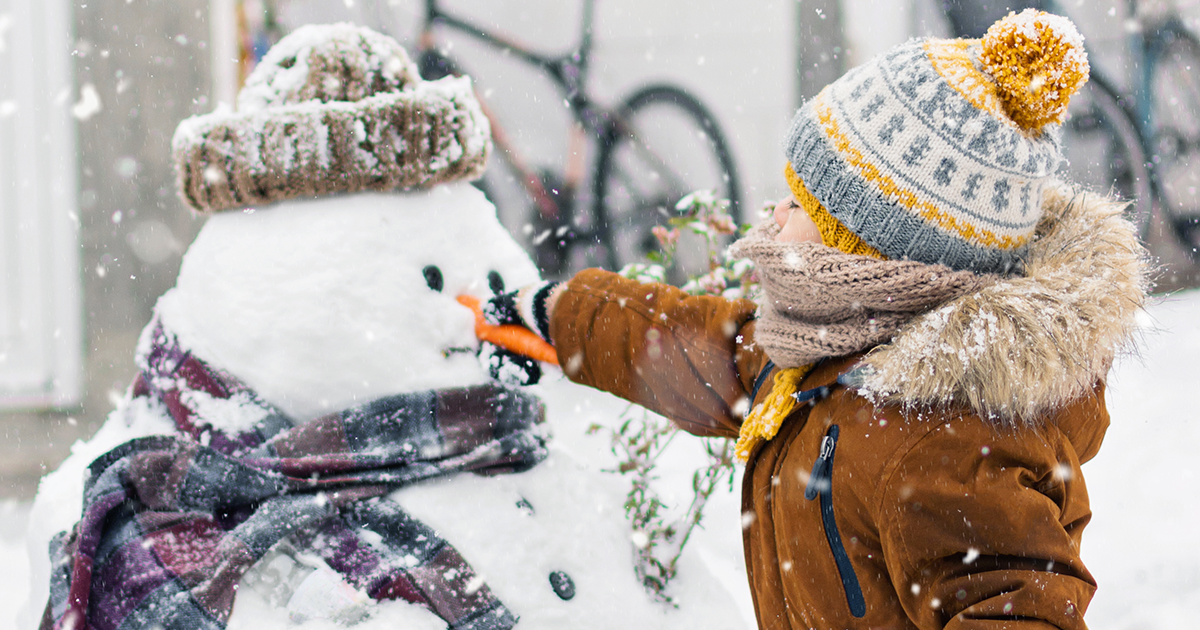Just because the weather is cooling down, it doesn’t mean that your kids should be kept indoors all winter long. In fact, there are many reasons to have them spend time outdoors, not least of which is to protect your child’s vision.
Studies show that children who spend time playing outdoors in the sunshine experience less myopia progression than those who stay indoors. Moreover, encouraging more outdoor playtime is important for promoting overall health and well-being in your kids.
Below we’ll explore some fun outdoor activity ideas to try with your kids and discuss why spending time outdoors may slow a child’s myopia progression or even postpone its onset.
1. Snow Play
If you live in a snowy region, bundle up your kids in warm layers and have them:
- Build a snowman
- Enjoy a snowball fight
- Paint the snow with some food coloring or watercolors
- Make a snow maze
- Build an igloo
- Build snow castles (the same way you would sandcastles)
- Make snow angels
- Collect snowflakes during a snow flurry and study their beautiful shapes
2. Blow Ice Bubbles
Kids love playing with and popping bubbles. If temperatures are low enough, they might freeze in mid-air! They’ll get a kick out of watching them freeze and possibly catching or popping them.
To make your own bubble solution, mix 1 part water with 4 parts dish soap and a few drops of light corn syrup. It’s best to try this activity when winds are calm, as harsh breezes can cause the bubbles to pop before they freeze.
Once the bubbles have landed on a surface and are completely frozen, they are beautiful to photograph — which can be part 2 of this activity.
3. Go Sledding
Sledding is a classic winter activity that your child will love. To go sledding, all you need is snow, a sled, and a hill! Easy enough.
But before you hit the slopes (or hills), be sure to follow these safety guidelines:
- Choose a sled that can be steered and can brake
- Wear a helmet
- Dress warmly, but be careful as the scarf can get caught under the sled
- Children 5 years old and under should sled with an adult
4. Go on a Winter Scavenger Hunt
A winter scavenger hunt is a wonderful way to explore nature with all of your senses. Before you head out, make a list of things to see, smell, listen for, and feel. Ask your child to check each item off the list.
For example, your list can include listening for the sounds of birds chirping, footsteps crunching in the leaves, or water babbling in a nearby stream. On the list of things to look for, you can include different types of trees, animals, animal tracks, cloud shapes, birds’ nests, and more. Take your camera along and let your child take pictures of what they find.
You can also leave an empty space on the list for your child to fill as they explore new things on their own.
5. Decorate a Tree with Edible Ornaments For Animals
This activity is an unconventional twist on building a bird feeder and is perfect for those who live near a forest. The idea is to make edible ornaments and hang them on a tree (or potted plant in your garden) for wildlife to feed on during the winter.
Your ornaments can be made using various seeds, peanut butter, dried fruit, and popcorn. It’s best to use biodegradable materials to hang your ornaments, and don’t use fishing lines, as birds can get caught in it.
What’s the Connection Between Time Outdoors and Myopia?
There is increasing evidence that children who spend extra time daily playing outdoors have a reduced risk of developing myopia; and if they already have myopia, time spent outdoors could slow down the worsening of this condition, also known as myopia progression.
These findings are significant, as having myopia significantly increases a child’s risk of developing sight-threatening eye diseases later in life. Moderate to high levels of myopia make a child more susceptible to developing cataracts, retinal detachment, macular degeneration, and glaucoma later in life.
At Treehouse Eyes, our mission is to battle childhood myopia by providing myopia management to nearsighted children. Our myopia management treatments can effectively slow down your child’s myopia progression and reduce their future risk of eye disease.
If your child has myopia, or if you need your first consultation, contact us today to schedule a myopia eye exam.
Wishing you and all of our patients a healthy and enjoyable winter season!

Dr. Gaia Hess is a vision therapy and myopia management doctor with VisionQuest Eyecare. She’s passionate about pediatric eyecare and educating her young patients and their parents so they can understand what’s happening with their eyes and the best ways to improve their vision.

